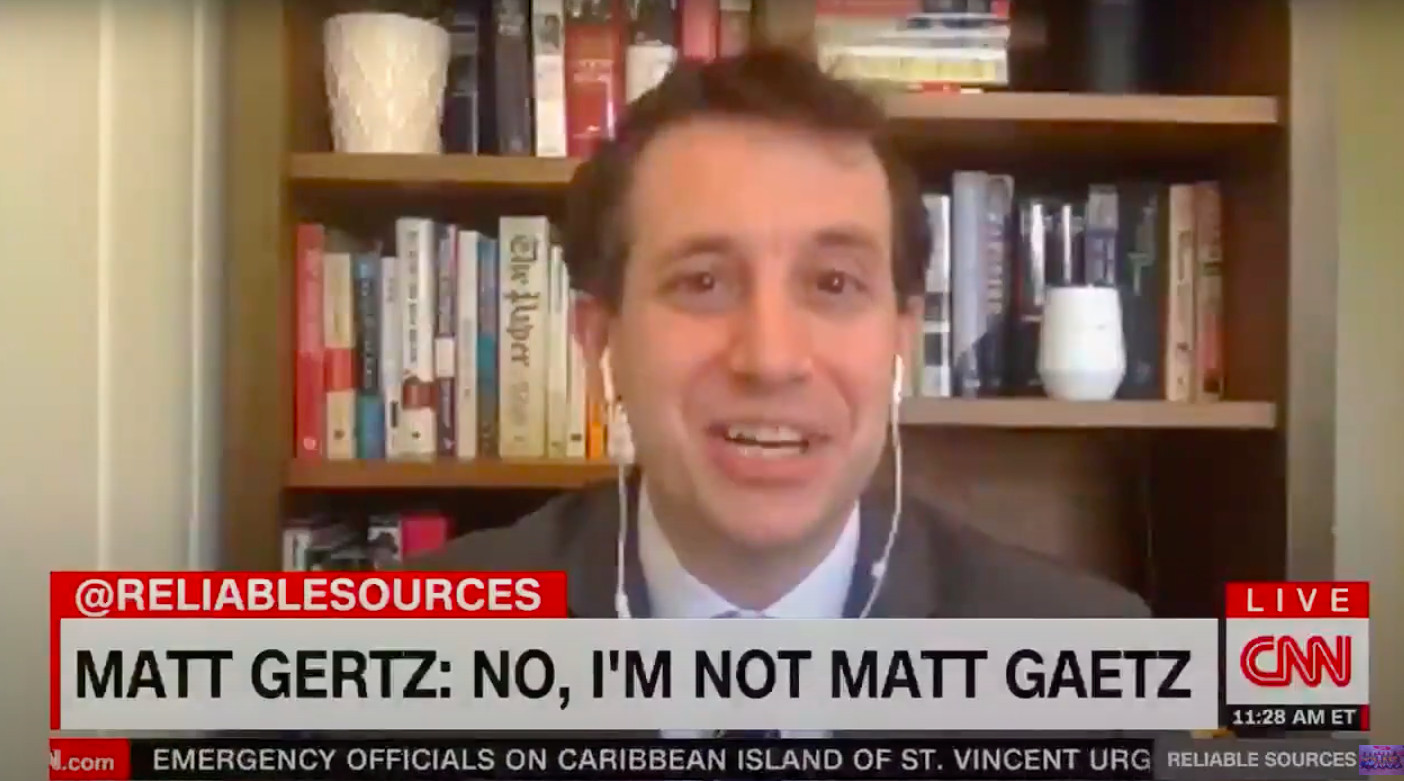Sign up for the daily CJR newsletter.
Every so often, Matt Gertz attracts attention because of who he’s not—specifically, Matt Gaetz, the Republican US congressman from Florida. Since the latter’s rise to national prominence as a firebrand politician in 2017, the two have often been mistaken on Twitter, where their handles differ by only a few letters. In early April, after news broke that the Department of Justice was investigating Gaetz for alleged sex trafficking and relations with a 17-year-old girl, messages intended for Gaetz flooded Gertz’s mentions. Yesterday evening, after the Daily Beast further developed the Gaetz story, Gertz readied himself:
— Matthew Gertz (@MattGertz) April 30, 2021
The irony is rich: Gertz, a senior fellow at Media Matters for America, a progressive media watchdog, has tracked right-wing disinformation and Fox News’ influence on the Republican Party for 14 years; he considers Gaetz a member of what he calls the “Fox News caucus.” CJR recently spoke with Gertz about the evolution of Fox News, how it aided the rise of the Tea Party and Trumpism, the role of Media Matters, and what it was like to become a minor character in media coverage of the investigation into Gaetz. The conversation has been edited for length and clarity.
CJR: How has the right-wing media ecosystem evolved since you started tracking it in 2007?
Matt Gertz: I think what we’ve seen over the years is a fusion of these two spheres—the world of Republican politics and the world of right-wing media have become one and the same.
When I started, Media Matters paid attention to Fox News, which we viewed as an outlet that was promoting right-wing talking points and having a lot of influence. But we did not yet see it as a sort of bedrock part of the institutional Republican Party in the way it is today.
After Barack Obama was elected, Roger Ailes made a conscious decision to turn the network into an arm of the Republican Party. He would tell people that Fox was “the Alamo,” and they were fighting back as the voice of opposition against Barack Obama and his administration. As the Obama years went by, they were really mobilizing a lot of grassroots Republican energy around their particular obsessions—around immigration, and Muslims, and Obama’s birth certificate, and so on. This was a time period in which Glenn Beck was becoming an increasingly influential figure, a sort of forerunner of the more conspiratorial programming that was to come in later years.
Donald Trump began weekly appearances on Fox and Friends in 2011; the show gave him a platform to speak directly to that Fox audience, which he would later come to see as his personal political base. He was following a fairly well-trod path at that point: You had a variety of Republican politicians, or would-be politicians, who had spent time at Fox News and used their platform to build relationships with its audience before running for office. Newt Gingrich’s presidential run in 2012, or Ben Carson’s presidential run in 2016, likely would not have been possible if they hadn’t been kept in the public eye for so long by Fox News.
CJR: For the politicians that have come up through the Fox News pipeline in the last 10 years, how do you think their experience at that network shapes them as politicians?
MG: I think that they understand that Fox is creating a very particular demand from its audience by engaging in a particular type of demagoguery, by playing on particular themes. The network is creating a scenario where the Fox viewership, which is effectively the Republican base, comes to demand that from its politicians, as well. So the politicians who are successful in the Republican Party are ones who can command the attention of that base by feeding them the same stuff that Fox does. The best way to do that, of course, is to go on Fox News regularly.
I think that there is not a left-wing press with the same influence on the Democratic Party that you see the right-wing press having on the Republican Party. Donald Trump watched hours of Fox News at all times. That single network shaped his worldview to a tremendous extent, and he really shaped federal policy around the distorted coverage he saw on Fox. You had more than a dozen Trump Administration officials who previously had Fox on their resume.
If you look at Trump’s handling of the Coronavirus, that’s something that was very much shaped by what right-wing commentators were telling him through his television set. His obsession with hydroxychloroquine, the anti-malarial medication, followed coverage from Fox News. His desire to reopen the economy as soon as possible out of fear that the response to COVID-19 was going to be “worse than the problem itself”— this followed coverage from Fox, as well. He hired Scott Atlas, a radiologist, to be on his Coronavirus Task Force after seeing him on Fox News. These sort of direct, real-world implications of the power the right-wing media, and Fox news in particular, has on the Republican Party—and, through it, the government—are really quite substantial, worrisome, and worthy of study and review.
CJR: Tucker Carlson’s apparent embrace of the great replacement conspiracy theory has made a lot of headlines in the media world.
MG: Fox News has often reflected the elements of the Republican party that are in ascendence. As Trump became the standard bearer, you had this rise of the alt-right, and this sort of fringy, white nationalist-inflected group of commentators who were gaining influence along with Trump. Tucker Carlson was someone who, I think, saw that energy and glommed onto it. I wrote my first story about the affinity that white nationalists have for Tucker Carlson back in 2017. They thought that he was mainstreaming talking points—taking these white nationalist ideas, changing the wording just enough to have a speck of deniability, and then passing it out to an audience of three to four million people every night. That’s been a long time coming; it’s not the first time that he’s invoked the idea of replacement, of Democrats or elites trying to replace the “current Americans” as some sort of way to gain power.

Screenshot of Gertz on CNN via YouTube
CJR: After news broke that Matt Gaetz was under investigation for allegations of possible sex trafficking, Gaetz gave an interview to Carlson in which Gaetz said he was the victim of a smear campaign, accused a 25-year-retired DOJ employee of extorting him, and recalled a dinner he once had with Carlson and a woman he alleged to be involved in the probe. Later, Carlson called it “one of the weirdest interviews I’ve ever conducted.” What about that interview surprised you?
MG: Honestly, not much of it surprised me. It’s a natural attempt for Carlson to try to get attention for his show. It’s a natural attempt for Gaetz to try to get attention for himself.
CJR: How do you see Fox News covering the breaking story around Matt Gaetz?
MG: Well, they’re not. That’s the easiest way to say it.
By our count, Gaetz has done 310 weekday Fox News appearances since August 2017, which is when our database begins. Almost half of them were on Sean Hannity’s show—127 interviews on just that single primetime program. So, historically, Fox News has loved talking about Matt Gaetz and having him on. But since this scandal broke, it’s been basically radio silence. There was the Carlson interview, and then about 24 hours of uneven coverage of that interview, and since then they’ve basically abandoned him altogether.
CJR: You obviously have your own role in this story now. There have been headlines about you being confused with Matt Gaetz.
MG: It’s pretty weird, I have to say. I’m used to a certain level of dystopia around media coverage of stuff that I do. My biggest focus of the last several years was just being the guy who deciphers Donald Trump’s tweets and figures out which Fox News segment he is responding to. So I’m used to getting talked about around some weird stuff. But the way my Twitter mentions tend to dissolve into anarchy whenever Matt Gaetz does something particularly outlandish does seem very interesting to a lot of people. It’s unusual to have members of your family say that they’ve read about your Twitter mentions in the New York Times. That’s odd.
What I like about it is that I’ve tried to make my own response to it fairly light. I’ve tried to make it a joke that people on Twitter can share together. And people who are in on the joke are quite kind about it. They are quick to tell other people that they see in my mentions that they have got the wrong guy. And they do so very politely, as I have asked them to do. It becomes a sort of shared Twitter experience that is more positive than, I think, the typical level of bile that one sees on that particular website.
ICYMI: Unraveling the Protest Paradigm
Has America ever needed a media defender more than now? Help us by joining CJR today.







